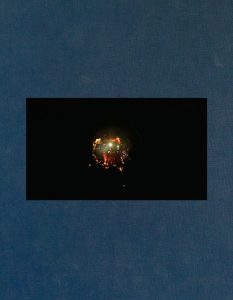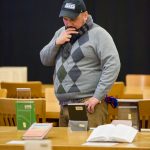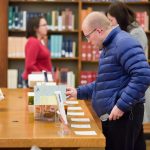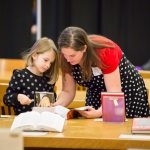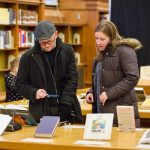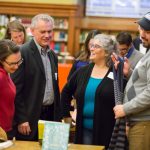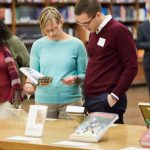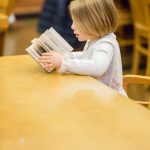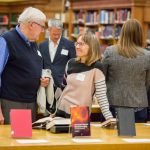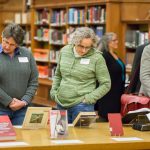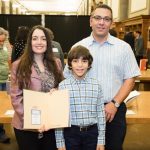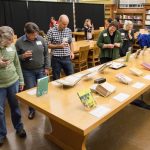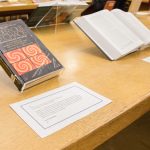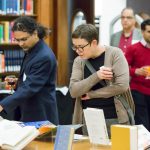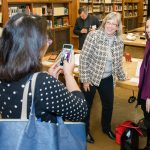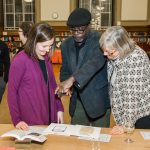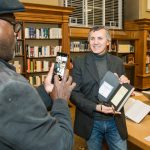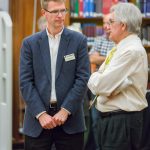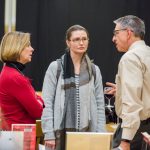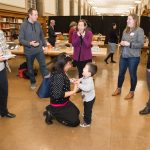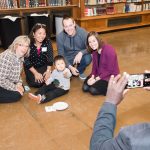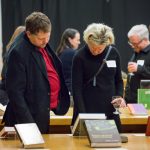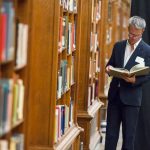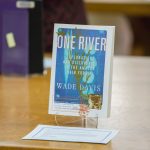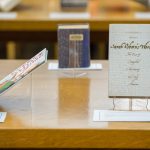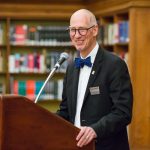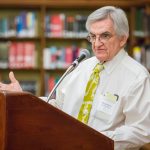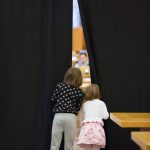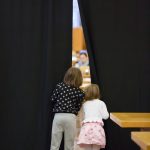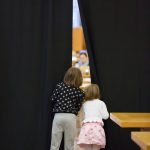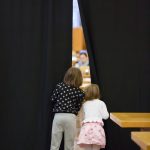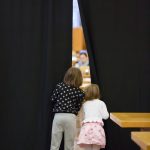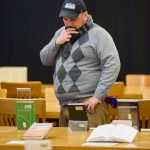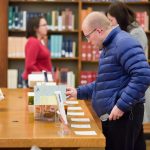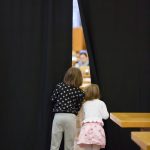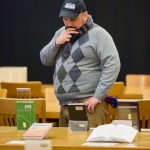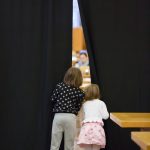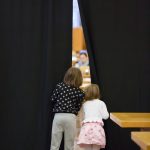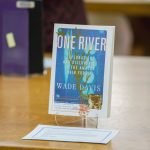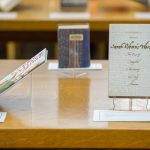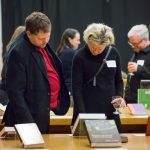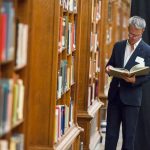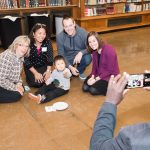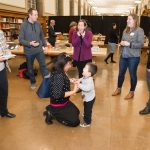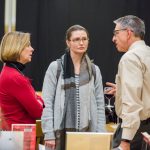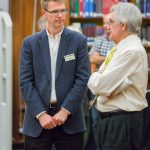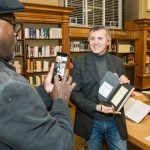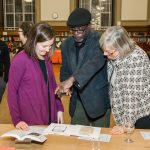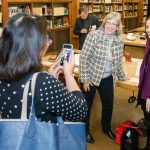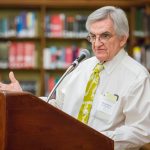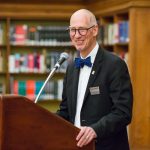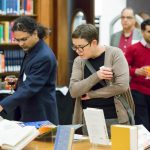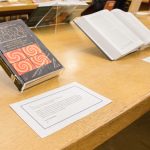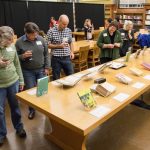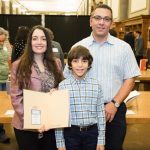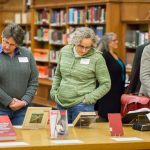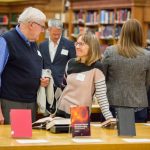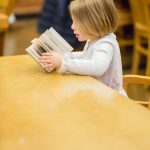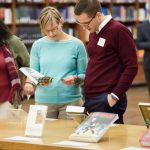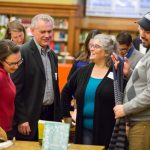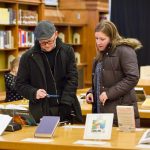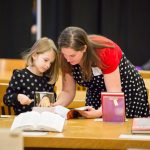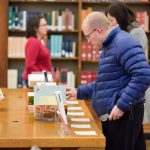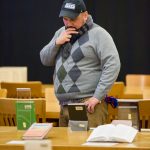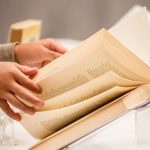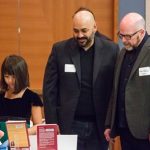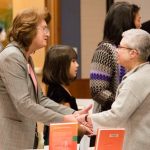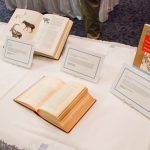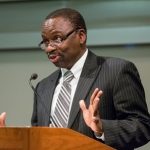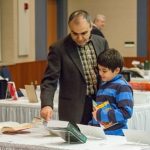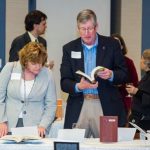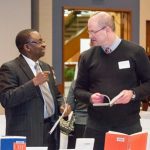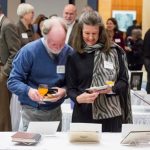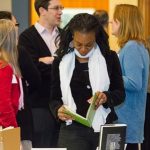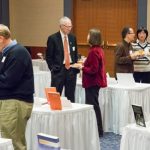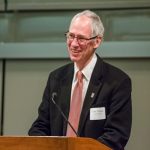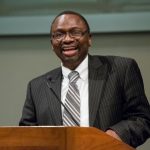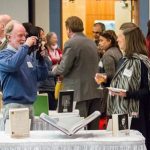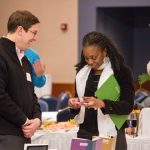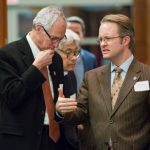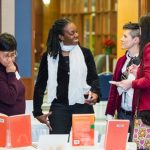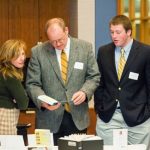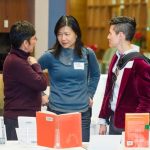Jean Paul Allain (Nuclear, Plasma and Radiological Engineering)
Order out of Chaos: Man’s New Dialogue with Nature by Ilya Prigogine and Isabelle Stengers
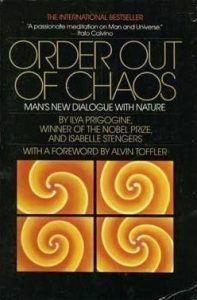
Prigogine is a distinguished Nobel laureate who pioneered the work on dissipative structures and self-organization in complex systems. I met Prof. Prigogine during my first research experience at UT Austin. That meeting inspired the direction of my career and my passion for understanding self-organization and patterns on material surfaces driven under far-from-equilibrium conditions (e.g. plasmas).- Jean Paul Allain
Diane Beck (Psychology)
Vision Science : Photons to Phenomenology by Stephen E. Palmer
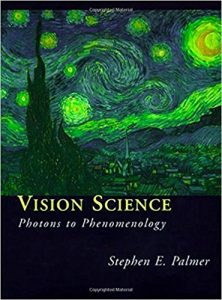
This textbook was written by PhD advisor. I now teach from it. It is an excellent introduction to the field of vision science, beautifully capturing the diversity of disciplines that have contributed to our understanding of the human visual system. – Diane Beck
Mohamed Boubekri (Architecture)
What the Day Owes the Night by Yasmina Khadra

A novel by Yasmina Khada, a female nom de plume taken by a male Algerian author to escape the terrorism of the 1990s. This love story rings very close to me personally as it takes place where I grew up. This is a love story of a young Algerian boy and a French colonial girl… – Mohamed Boubekri
Meghan Burke (Special Education)
Our Brother Has Down’s Syndrome by Shelley Cairo
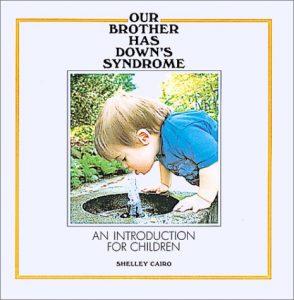 My parents read this book to me when they found out my brother would have Down syndrome. This book was my first introduction to disabilities. It started my journey in the disability field as a professional and family member. – Meghan Burke
My parents read this book to me when they found out my brother would have Down syndrome. This book was my first introduction to disabilities. It started my journey in the disability field as a professional and family member. – Meghan Burke
Josue Cisneros (Communication)
Borderlands/La Frontera: The New Mestiza by Gloria E. Anzaldua

This is a brilliant and heart-wrenching work of autobiography, literature, poetry, and scholarship. It offers a defining take on borders of all kinds – geographic, linguistic, identitary. Reading this book was a transformative experience, and I am still trying to come to grips with all of the insights it offers for my life and work. – Josue Cisneros
Lee DeVille (Mathematics)
Stochastic Processes by Joseph Doob
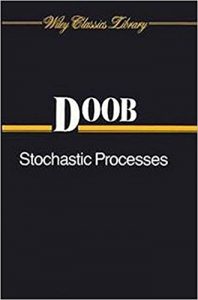 Joseph Doob’s book was foundational in the development of modern probability theory, and it has had a tremendous impact on our understanding of phenomena in every branch of science and engineering. – Lee DeVille
Joseph Doob’s book was foundational in the development of modern probability theory, and it has had a tremendous impact on our understanding of phenomena in every branch of science and engineering. – Lee DeVille
Travis Dixon (Communication)
Race/Gender/Class/Media by Rebecca Lind
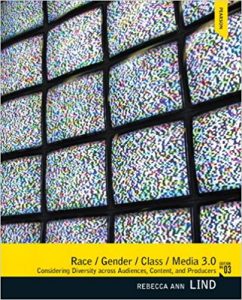 This book chronicles the centrality of stereotypical representations within media and the effects on consumers. I have made a contribution to each edition of this book. Although the study of media effects has changed a great deal over my career, the constructs discussed in this book remain relevant in our fractured political and social fabric. – Travis Dixon
This book chronicles the centrality of stereotypical representations within media and the effects on consumers. I have made a contribution to each edition of this book. Although the study of media effects has changed a great deal over my career, the constructs discussed in this book remain relevant in our fractured political and social fabric. – Travis Dixon
Francina Dominguez (Atmospheric Sciences)
One River by Wade Davis
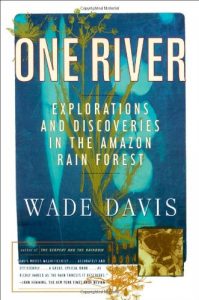
As a hydroclimatologist, I find the Amazon River system fascinating from an atmospheric and hydrologic perspective. However, this book revealed new aspects of the Amazon related to the rich intertwined biological and social complexities of the region. I also liked to dream about being an explorer of the Amazon basin. – Francina Dominguez
Michael Donohoe (Accountancy)
Every Little Thing by Cedella Marley
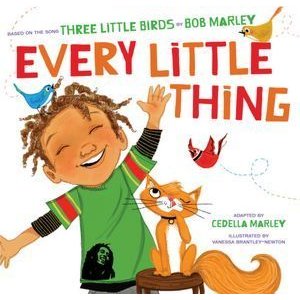
As a picture book adaptation of one of Bob Marley’s most cheerful songs, “Every Little Thing” reminds us to be hopeful, kind, and, loving every day. It is my favorite book to read to my music loving son, Nicholas. – Michael Donohoe
Brittany Duff (Advertising + Institute of Communications Research)
It’s So Magic by Lynda Barry
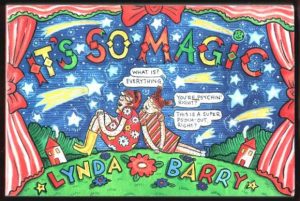 As a pre-teen, I discovered Lynda Barry’s comics. Even though I didn’t know her, I felt like she understood my life. The idea of connecting to people through media is what started my career. – Brittany Duff
As a pre-teen, I discovered Lynda Barry’s comics. Even though I didn’t know her, I felt like she understood my life. The idea of connecting to people through media is what started my career. – Brittany Duff
Jonathan Ebel (Religion)
Sarah Osborn’s World: The Rise of Evangelical Christianity in Early America by Catherine A. Brekus
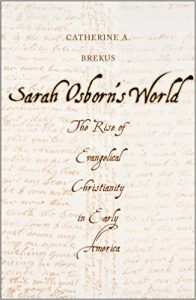 Catherine Brekus was my dissertation adviser and has been a wonderful friend to me. I am here in large part because of her. – Jonathan Ebel
Catherine Brekus was my dissertation adviser and has been a wonderful friend to me. I am here in large part because of her. – Jonathan Ebel
Nora El-Gohary (Civil and Environmental Engineering)
A Little Peace by Barbara Kerley
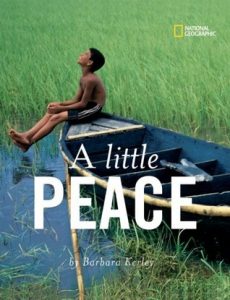 Each one of us – regardless of who we are, where we come from, and what we believe in – has immense power to change the world and spread peace. What a powerful message to give our children and ourselves! Reading this book with my children was both fun and thought-provoking. – Nora El-Gohary
Each one of us – regardless of who we are, where we come from, and what we believe in – has immense power to change the world and spread peace. What a powerful message to give our children and ourselves! Reading this book with my children was both fun and thought-provoking. – Nora El-Gohary
Elif Ertekin (Mechanical Science and Engineering)
An Illustrated Book of Bad Arguments by Ali Almossawi
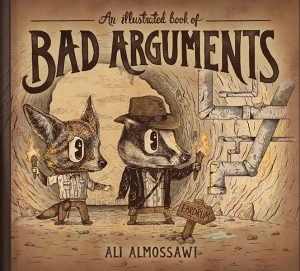
Nowadays we are constantly presented with new information to consider and to evaluate. Errors in reasoning are all around us, and the ability to navigate complex issues, think critically, and make sound and evidence-based conclusions are amongst the most important skills we can learn. – Elif Ertekin
Randy Ewoldt (Mechanical Science and Engineering)
A Short Story of Nearly Everything by Bill Bryson
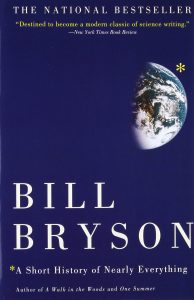
A delightful broad summary of humanity’s scientific understanding, how we got it, and the personalities involved. With vivid reminders of our humble place in it all. Read and enjoy as trillions of drifting atoms “let you experience the supremely agreeable but generally underappreciated state known as existence. – Randy Ewoldt
Goddard, Lynford (Electrical and Computer Engineering)
A Project-Based Exploration of Electrical and Computer Engineering – Lynford L. Goddard, Young Mo Kang, Steven J. McKeown, Alexandra Haser, and Cori C. Johnson
In 2010, my students and I wrote a manual for Girls Learning Electrical Engineering (GLEE), a residential weeklong summer camp at Illinois. Nearly 300 high school students have explored our ECE field through GLEE and other camps. After 8 years of improvements, we are finally turning the manual into a textbook to enable wider dissemination. – Lynford Goddard
Peter Goldsmith (Agricultural and Consumer Economics)
The Farm on the River of Emeralds by Moritz Thomsen
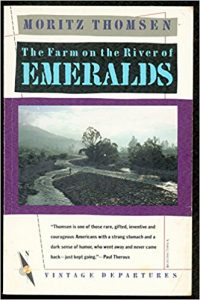
Thomsen presents a rare perspective into the psychology and behavior of the poorest in society. Beautifully written, the author presents his personal commitment to truly understanding the tragedy of the life of the poor. I too was a Peace Corps volunteer and worked near the setting for this book. – Peter Goldsmith
Angela Green (Agricultural and Biological Engineering)
The Invitation by Oriah
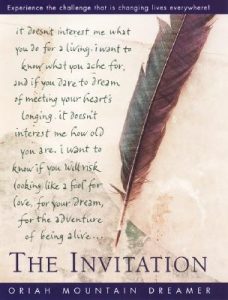 Along this tenure journey, I found myself more often than not replying to the question “how are you?” with “surviving.” Life is about more than mere survival, and The Invitation offered a great self-exploration for seeking meaning and purpose and deeper connection in relationships and life choices, both personal and professional. – Angela Green
Along this tenure journey, I found myself more often than not replying to the question “how are you?” with “surviving.” Life is about more than mere survival, and The Invitation offered a great self-exploration for seeking meaning and purpose and deeper connection in relationships and life choices, both personal and professional. – Angela Green
Indranil Gupta (Computer Science)
Canakya On Management (also appears as: “Chanakya On Management”) by Ashok R. Garde
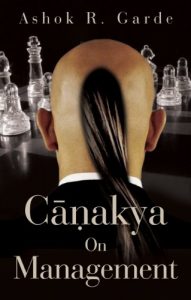
Chanakya (or Kautilya) was a teacher, economist, and philosopher in 4th century BCE. As chief advisor to Indian emperors Chandragupta and Bindusara, and helped establish the vast Mauryan Empire. Chanakya’s book “Arthasastra” is a treatise on how to manage kingdoms and teams. The selected book modernizes and adapts that classic to today’s age. – Indranil Gupta
Judy Havlicek (Social Work)
Overcoming the Odds: High Risk Children from Birth to Adulthood by Emmy E. Werner and Ruth S. Smith
 I read this book while enrolled in a certificate program on child abuse and neglect. The findings challenged conventional wisdom surrounding the life chances of poor, trauma-exposed, and too often, discarded children. They also brought home the value of a well-designed research study in revising understanding and catalyzing new solutions. – Judy Havlicek
I read this book while enrolled in a certificate program on child abuse and neglect. The findings challenged conventional wisdom surrounding the life chances of poor, trauma-exposed, and too often, discarded children. They also brought home the value of a well-designed research study in revising understanding and catalyzing new solutions. – Judy Havlicek
Katy Heath (Plant Biology)
The Secret Garden by Frances Hodgson Burnett
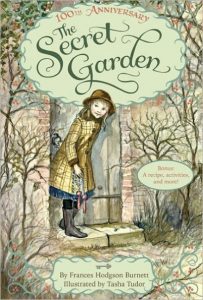
When I was a child, something about Mary’s awakening and rebirth on the moors inspired endless fantasies about my own walled garden and growing green things, despite my urban surroundings. I credit this book with piquing my interest in plants. – Katy Heath
Philipp Hieronymi (Mathematics)
Nathan the Wise by Gotthold Ephraim Lessing
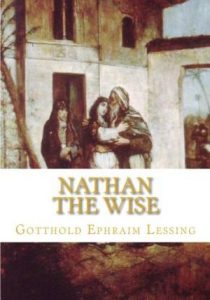 Being catholic and being married to a Muslim, Lessing’s plea for religious tolerance always had special meaning to me. Although written more than 200 years ago, its message could hardly be more timely. – Phillipp Hieronymi
Being catholic and being married to a Muslim, Lessing’s plea for religious tolerance always had special meaning to me. Although written more than 200 years ago, its message could hardly be more timely. – Phillipp Hieronymi
Prashant Jain (Department of Chemistry)
The Road to Reality: A Complete Guide to the Laws of the Universe by Roger Penrose
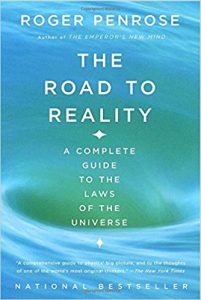
Penrose’s mathematical treatise, which I have had since graduate school, serves to remind me of the beauty of the laws of nature and their uncanny ability to be comprehended and encoded in the language of mathematics. Reading Penrose always fills me with philosophical reflection and scientific inspiration. – Jain Prashant
Laurie Johnson (Germanic Languages and Literatures)
Harry Potter and the Half-Blood Prince by J.K. Rowling
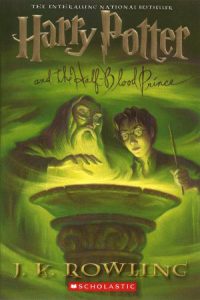 Reading this series aloud with our children led me to develop a Harry Potter course at Illinois. Book 6 leaves us uncertain and sad, but also hopeful. At the close of every semester, I see our students as Dumbledore sees Harry, near the end, when he says, “I am not worried, Harry…I am with you. – Laurie Johnson
Reading this series aloud with our children led me to develop a Harry Potter course at Illinois. Book 6 leaves us uncertain and sad, but also hopeful. At the close of every semester, I see our students as Dumbledore sees Harry, near the end, when he says, “I am not worried, Harry…I am with you. – Laurie Johnson
Lilya Kaganovsky (Comparative & World)
Abram Tertz and the Poetics of Crime by Catharine Theimer Nepomnyashchy
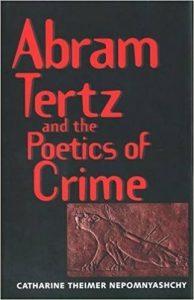 I have chosen this book in memory of Catharine Theimer Nepomnyashchy, mentor and friend. – Lilya Kaganovsky
I have chosen this book in memory of Catharine Theimer Nepomnyashchy, mentor and friend. – Lilya Kaganovsky
Karrie Karahalios (Computer Science)
Invisible Cities by Italo Calvino
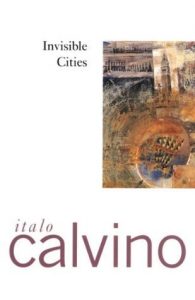 This book captures the magic of imagination and infrastructure from various societal and design perspectives. It inspired my dissertation and continues to inspire new work. – Karrie Karahalios
This book captures the magic of imagination and infrastructure from various societal and design perspectives. It inspired my dissertation and continues to inspire new work. – Karrie Karahalios
Angela Kent (NRES)
Developing Handling Skills for Awesome Agility Teams by Linda Mecklenburg
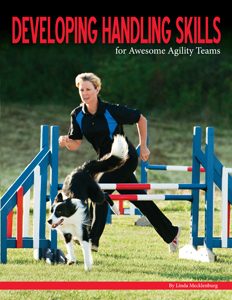
Our academic lives can be all encompassing. I took up dog training to find some work-life balance, and have enjoyed learning an exciting new discipline. This book is a foundational work in the sport of dog agility. Working towards mastery of this sport has enriched my life. – Angela Kent
Tomasz Kozlowski(Nuclear, Plasma, and Radiological Engineering)
Riemann Solvers and Numerical Methods for Fluid Dynamics: A Practical Introduction by Eleuterio F. Toro
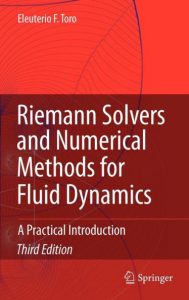
The fluid flow appears everywhere in nature, for me it is the most fundamental field of engineering. I hope the computational methods described in this book will give others an insight and inspiration that has allow me to learn and appreciate the beauty of computational fluid flow. – Tomasz Kozlowski
Ryan Lamare (Labor and Employment Relations)
Moneyball: The Art of Winning an Unfair Game by Michael Lewis
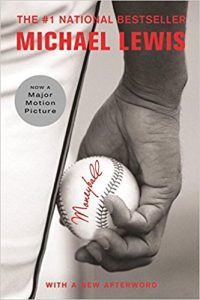 Hidden within a book about baseball is a story of employment relations, econometrics, strategy, and game theory. – Ryan Lamare
Hidden within a book about baseball is a story of employment relations, econometrics, strategy, and game theory. – Ryan Lamare
Lindgren, Robb (Curriculum & Instruction)
Experience and Education by John Dewey
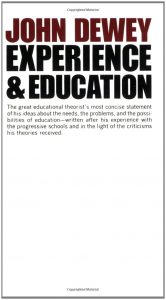 Dewey is the master of blowing up dichotomies and this is my favorite take down. Education *is* experience, and the challenge is finding the productive kinds of experiences to give students and the means to reflect upon those experiences. It’s the challenge that I try to take up in my own work every day. – Robb Lindgren
Dewey is the master of blowing up dichotomies and this is my favorite take down. Education *is* experience, and the challenge is finding the productive kinds of experiences to give students and the means to reflect upon those experiences. It’s the challenge that I try to take up in my own work every day. – Robb Lindgren
Lijun Liu(Geology)
Geodynamics by Donald Turcotte & Gerald Schubert
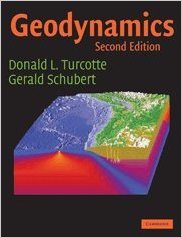
This is a book that I use most often, both in teaching and in research. This book has both breadth and depth about how the solid Earth works mathematically and physically. – Lijun Liu
Daniel Llano (Molecular and Integrative Physiology)
Exploring the Thalamus and Its Role in Cortical Function by Murray Sherman and R.W. Guillery.
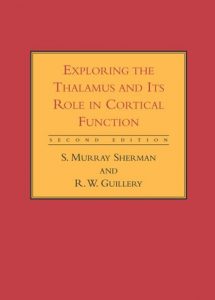 This book explored a new way of thinking about the thalamus, a key brain structure involved in all aspects of vertebrate cognition. The hypotheses developed in this book, centered around the idea that the thalamus plays an important role in intracortical communication, have been instrumental in launching many subsequent studies of higher brain organization. – Daniel Llano
This book explored a new way of thinking about the thalamus, a key brain structure involved in all aspects of vertebrate cognition. The hypotheses developed in this book, centered around the idea that the thalamus plays an important role in intracortical communication, have been instrumental in launching many subsequent studies of higher brain organization. – Daniel Llano
Jorge Lucero (Art Education)
39 Microlectures: In Proximity of Performance by Matthew Goulish
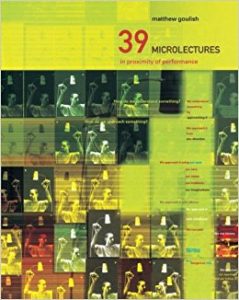
There are some books that I come back to at every important moment of my scholarship, creative practice, and teaching. Although this book is about performance practice and I understand it as an academic text, it has informed every area of my life. – Jorge Lucero
Jonathan MacDonald(Linguistics/Spanish & Portuguese)
Critique of Pure Reason by Immanuel Kant
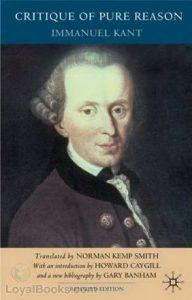
Critique of Pure Reason aroused in me a deep interest in the nature and structure of the mind that has persisted to this day. – Jonathan MacDonald
Gayle Magee (School of Music)
A Sisterhood of Suffering and Service: Women and Girls of Canada and Newfoundland During the First World War by Sarah Glassford and Amy J. Shaw (eds.)
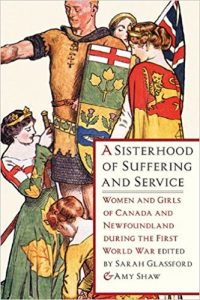
One of my research areas addresses intersections of gender and music in Canada and trans-nationally during the First World War, so this title is of interest to me. – Gayle Magee
Raksha Mudar (Speech and Hearing Science)
Gandhi: An Autobiography – The Story of My Experiments With Truth by Mohandas Karamchand (Mahatma) Gandhi (Author), Mahadev H. Desai (Translator)
 This book has had a profound impact on my thinking and my approach to learning from life experiences. – Raksha Mudar
This book has had a profound impact on my thinking and my approach to learning from life experiences. – Raksha Mudar
Michelle Nelson (Advertising)
The Man Who Tasted Shapes by Richard E. Cytowic
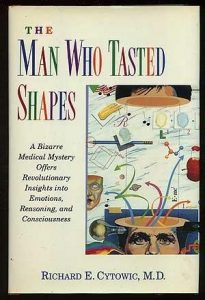
Intrigued by the advertising headline, “Can’t You Just Hear this Color?” by a paint company, I wrote a paper on synesthesia /metaphor in grad school in the early 1990s. This book sparked my interest in the strange and wonderful ways the brain works and led to my master’s thesis and my career shift into academia. – Michelle Nelson
Jeananne Nichols (School of Music)
Fields of Play: Constructing an Academic Life by Laurel Richardson
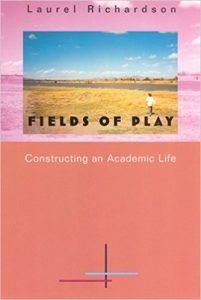
My precious copy of this book is worn, highlighted, full of notes, and autographed by the author. Richardson gave me both permission and courage to think and write in ways that serve the substance, not the form, that I might illuminate the human musical experience and how it draws us together in community. – Jeananne Nichols
David O’Brien (Art and Design)
Journal by Eugene Delacroix (Michele Hannoosh)
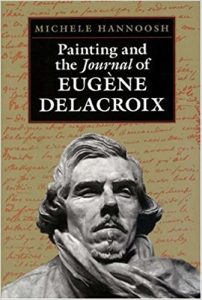
Delacroix’s Journal is among the most famous written works by an artist in the history of art. Therefore, it is surprising that Michele Hannoosh’s edition completely revises previous versions and adds many previously unknown texts. Her work was essential for my own research on Delacroix. – David O’Brien
Brian Ogolsky (Human Development and Family Studies)
The Things They Carried by Tim O’Brien
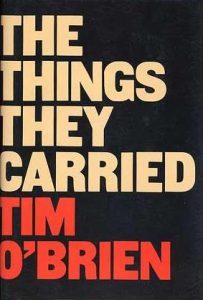
A brilliant demonstration of the power of our own psychology and a reminder that the past is the lens through which we view the future. It was this book that inspired my quest to understand the things we all carry. – Brian Ogolsky
Ned O’Gorman (Communication)
Organizing Enlightenment by Chad Wellmon
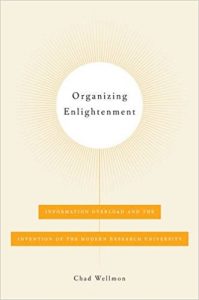
There are books, and then there are the books of friends. Chad Wellmon is a true friend: collaborator, conversation partner, inspiration. I had the privilege of reading this book in draft form, offering feedback. It’s a great work in intellectual history. I am grateful to have been part of its appearance in the world. – Ned O’Gorman
Dipanjan Pan (Bioengineering)
Leonardo’s Notebooks: Writing and Art of the Great Master by Leonardo Da Vinci (Author) and Anna Suh (Editor)
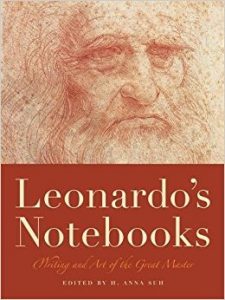
Da Vinci has been a true inspiration for my scientific and creative queries. Considered as a “Renaissance Man”, his works document his fascinating journey beyond painting and attest his voracious curiosity in architecture, anatomy, science and engineering. I consider him the first bioengineer of our times. – Dipanjan Pan
Melissa Pokorny (Art + Design)
Apichatpong Weerasethakul (Artist), Alaina Feldman (Foreword), Kate Fowle (Foreword)
This book documents the work and process of an artist whose films and installations have been extremely meaningful to my practice. He deserves wider attention than he typically gets here in the U.S. – Melissa Pokorny
Carlos Pantano-Rubino (Mechanical Science and Engineering)
The Algebraist by Iain M. Banks
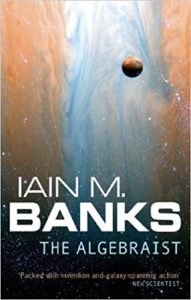 Banks was an extraordinarily imaginative science fiction writer that mastered the English language beauty. In this book, he presented a world of extraordinary detail and an intriguing plot. – Carlos Pantano-Rubino
Banks was an extraordinarily imaginative science fiction writer that mastered the English language beauty. In this book, he presented a world of extraordinary detail and an intriguing plot. – Carlos Pantano-Rubino
Robert Perry (Theatre)
Cinecitta by Federico Fellini (Translated by Graham Fawcett)
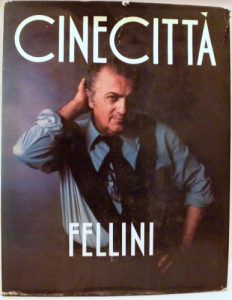
In the world where theatre and film often collide, I have found Fellini’s work to be stimulating, passionate, thought-provoking and revolutionary. His inventiveness and use of theatrics in all of his films has been a constant source of inspiration in my own theatrical design work beginning with my graduate studies at Yale University. – Robert Perry
Steven Petruzzello (Kinesiology & Community Health)
The Biopsychology of Mood and Arousal by Robert E. Thayer
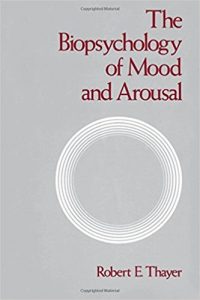
Thayer’s way of capturing mood and arousal and how physical activity impacted our emotional life was a foundation for the research I have pursued ever since. – Steven Petruzzello
Maxim Raginsky (Electrical and Computer Engineering)
Metod Potent︠s︡ialʹnykh Funkt︠s︡iĭ v Teorii Obuchenii︠a︡ mashin by M. A. Aizerman, E. M. Braverman, L. I. Rozonoer
This book still remains relatively obscure, yet it has laid the foundations for kernel methods and stochastic approximation algorithms that are used today in machine learning. Many of the results reported in this book have been rediscovered multiple times since. – Maxim Raginsky
Matthew Rispoli (Speech and Hearing Science)
Aspects of a Theory of Syntax by Noam Chomsky
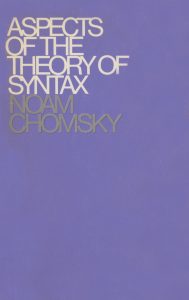
Reading it made me realize that human language is an expression of our innate, species specific nature. – Matthew Risposli
David Rosch (Agricultural Education)
In Over Our Heads: The Mental Demands of Modern Life by Robert Kegan
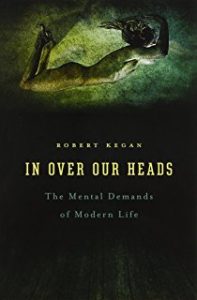 Even though this book is now 20 years old, I have not yet found anything that better explains why leading and working with other humans is as complex and challenging as it is in today’s world. I recommend it to anyone who engages in human relationships! – David Rosch
Even though this book is now 20 years old, I have not yet found anything that better explains why leading and working with other humans is as complex and challenging as it is in today’s world. I recommend it to anyone who engages in human relationships! – David Rosch
Holly Rosencranz (Medicine)
The Remains of the Day by Kazuo Ishiguro

I was profoundly struck by the personal choices of the main character whose life time goal was to be the perfect butler. Ishiguro’s ability to express the butler’s reflections on his past life and possible choices for the future significantly resonated with me at this time in my own personal and professional journey. – Holly Rosencranz
Romit Roy Choudhury (Electrical and Computer Engineering)
Madame Curie: A Biography by Eve Curie
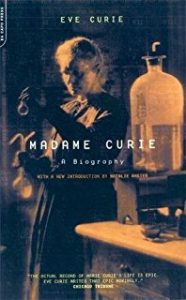 This inspired me tremendously towards dedicating my life to science and engineering. – Romit Roy Choudhury
This inspired me tremendously towards dedicating my life to science and engineering. – Romit Roy Choudhury
Lynne Rudasill (University Library)
Open Access and Digital Libraries: Social Science Libraries in Action = Acceso Abierto y Bibliotechas Digitales: Las Bibliotecas de Ciencias Sociales en Accion. by Rudasill, L.M. & Dorta-Duque, M.E.
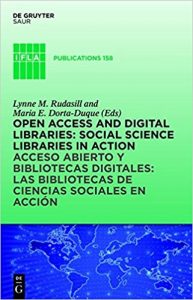
The first fully bi-lingual work in the IFLA Green Books series, it underlines the universal cooperation and dedication visible in international librarianship. Its genesis – an IFLA conference in Cuba in 2011 – reminds me of all the wonderful colleagues I have had the pleasure to meet and work with. – Lynne Rudasill
Robert Rushing (French & Italian; Comparative & World Literature)
Appunti di Viaggio by Giorgio Signorile
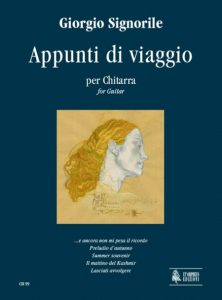
Classical guitar has been a major part of my life for 30 years, and these delightful (and quite playable) pieces aren’t in our library. It’s important to affirm the value of what lies outside of work; the life of the mind is in books, of course, but also in art. – Robert Rushing
Srinivasa Salapaka (Mechanical Science and Engineering)
The Feynman Lectures on Physics: Commemorative Issue, Three Volume Set by Richard P. Feynman, Robert B. Leighton, Matthew Sands
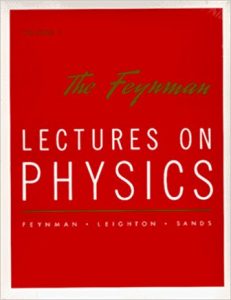
This book’s conversational tone and common-sense based motivation and explanations makes it one of the most enjoyable ways to understand basic principles of Physics – Srinivasa Salapaka
Andiara Schwingel (Kinesiology and Community Health)
Multitudinous Heart: Selected Poems: A Bilingual Edition by Carlos Drummond de Andrade
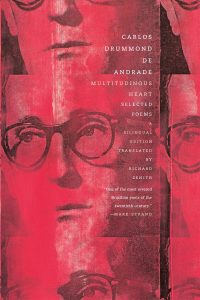
Carlos Drummond de Andrade was my great inspiration for arts and science. This book reminds me of my wonderful childhood in Brazil. – Andiara Schwingel
Sonali Shah (Business Administration)
Street Corner Society: The Social Structure of an Italian Slum by William Foote Whyte
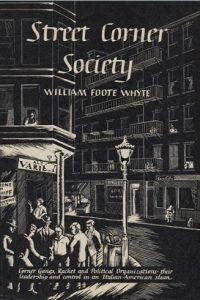
Ethnography can reveal the vastly different lived-experiences of people in the “same” social world. This book serves as a reminder that we are products of both our choices and the society around us. – Sonali Shah
Matthew Stewart (Veterinary Clinical Medicine)
Island Home: A Landscape Memoir by Tim Winton
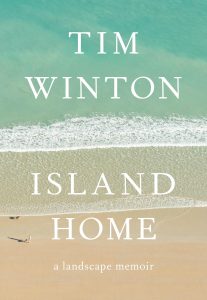
Tim Winton’s memoir of his childhood, growing up in Australia, pretty much describes my own childhood. Reading this was authentically nostalgic. – Matthew Stewart
Dusan Stipanovic (Industrial and Enterprise Systems Department and Coordinated Science Laboratory)
Naming Infinity: A True Story of Religious Mysticism and Mathematical Creativity by Loren Graham and Jean-Michel Kantor
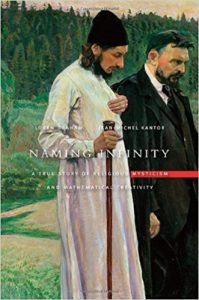 This book provides an inspiring story about Dmitri Egorov and his students. – Dusan Stipanovic
This book provides an inspiring story about Dmitri Egorov and his students. – Dusan Stipanovic
Victoria Stodden (School of Information Sciences)
The Scientist as Rebel by Freeman Dyson
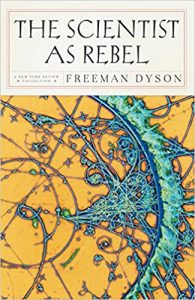
Science and research are fundamentally about the discovery of truths, for their own sake, which necessitates a willingness to confront untruths. – Victory Stodden
Brad Sutton (Bioengineering)
Microscopic Magnetic Resonance Imaging: A Practical Perspective by Luisa Ciobanu
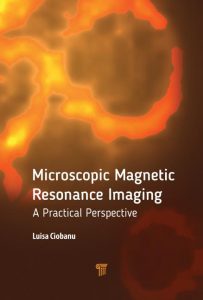
Luisa Ciobanu was one of several brilliant people at Illinois that encouraged me to not accept something as impossible just because others said it was. This book demonstrates how to use magnetic resonance imaging to not just see underneath the surface, but beyond what the eye can see. – Brad Sutton
Pawan Takhar (Food Science and Human Nutrition)
Zen and the Art of Motorcycle Maintenance by Robert Pirsig
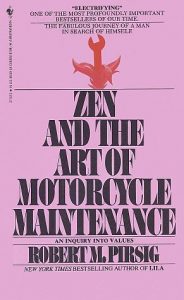
This book had a profound impact on my attitude toward research. It enabled me to enjoy the process of solving mathematical problems in food science even more than savoring the final outcomes. – Pawan Takhar
Robert Tierney (East Asian Languages and Cultures and Comparative and World Literature)
Seven Japanese Tales by Junichiro Tanizaki
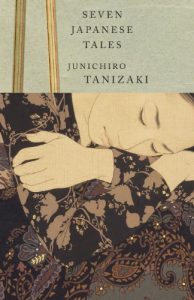
This book opened my eyes to Tanizaki, one of the best Japanese writers and one of the greatest storytellers in world literature. Howard Hibbett is a masterful translator and an inspiration for my own translations. I hope it will inspire future readers at the University of Illinois – Robert Tierney
Marci Uihlein (School of Architecture)
An Engineer Imagines by Peter Rice
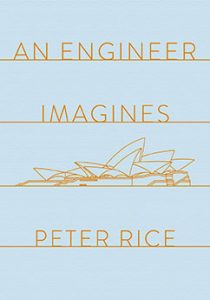
With this book, Peter Rice asks that engineers be recognized for their inherent creativity. He makes this request to everyone, though especially structural engineers as they envision their own profession. I believe, as Rice does, that engineers are explorers. We all benefit when engineers move beyond calculations to include design and imagination in their practice. – Marci Uihlen
Oscar E. Vázquez (Program in Art History; School of Art + Design)
Origins of Totalitarianism by Hannah Arendt
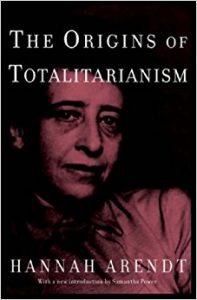
A beautifully written work that continues to offer important insights in our time. – Oscar E. Vásquez
Liliane Windsor (School of Social Work)
Laughter Out of Place: Race, Class, Violence, and Sexuality in a Rio Shantytown by Donna Goldstein
 In reading this book, I relived many of my experiences growing up privileged in Brazil. Although this time, these experiences were given back to me from the perspectives of marginalized Brazilians of color for the first time. Goldstein’s accounts helped shatter my limited world views and inspired my lifetime passion and commitment to social justice. – Liliane Windsor
In reading this book, I relived many of my experiences growing up privileged in Brazil. Although this time, these experiences were given back to me from the perspectives of marginalized Brazilians of color for the first time. Goldstein’s accounts helped shatter my limited world views and inspired my lifetime passion and commitment to social justice. – Liliane Windsor
David Wright (English)
Another Country by James Baldwin
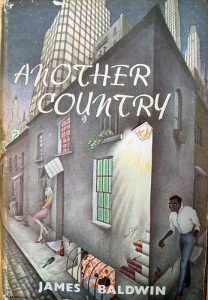
Following Baldwin’s lead, I left the U.S. in my twenties and landed in Paris, hoping to become a writer. I read and re-read his books, any I could get my hands on, until I realized I needed to read beyond just him. The book I return to even now, thirty years later, is Another Country. – David Wright
Tao Xie(Computer Science)
The New ABCs of Research: Achieving Breakthrough Collaborations by Ben Shneiderman
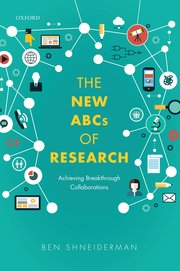 This book provides valuable guidelines for researchers to conduct applied and basic research together to produce impact on the society, and advocates the collaborations of science, engineering, and design to accomplish so. It is a great book for academic and industrial researchers, students, higher-ed administrators, government policy makers, and funding agency leaders. – Tao Xie
This book provides valuable guidelines for researchers to conduct applied and basic research together to produce impact on the society, and advocates the collaborations of science, engineering, and design to accomplish so. It is a great book for academic and industrial researchers, students, higher-ed administrators, government policy makers, and funding agency leaders. – Tao Xie
